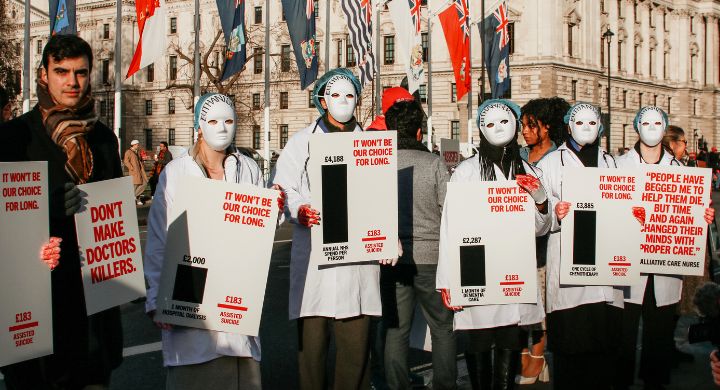Paul Huxley expounds how assisted suicide inevitably becomes a money-saving scheme that prioritises the bottom dollar over saving and sustaining vulnerable lives.
The Bible says that the love of money is a root of all kinds of evil.
But if we introduce assisted suicide, the love of money will have stiff competition in the love of death.
It’s expected that the impact assessment of Kim Leadbeater’s assisted suicide bill will claim that it would save the treasury money if it comes into force.
Pro-dying campaigners like to call what they are offering ‘assisted dying’. This has long confused ordinary members of the public into thinking this is normal end of life care – making sure someone is assisted while they die of natural causes. Maybe giving them extra painkillers or sedatives as they pass away.

But ‘assisted dying’ offers poison to the ‘terminally ill’. Drugs that would actively kill the healthiest of us if we took enough of them.
And the introduction of assisted suicide would also be poisonous to society in many other ways.
Suicide as ‘healthcare’
A state-sponsored assisted suicide service presents lethal drugs as an alternative medical treatment.
The moment it does so, every other treatment or care that the NHS or social services might provide becomes just one option for someone going through health struggles. For everyone who is involved there lurks in the back of their mind the thought: “maybe death would be better.”
Hardly anyone will say it out loud. But we know that, where it’s legal, 4 in 10 assisted suicide and euthanasia patients are motivated by feeling like they are or could be a burden on others.
In a world where disabled people are constantly made to feel like a burden, and disproportionately suffer from mental health struggles, this is wildly dangerous.
Pro-dying MPs have blocked several amendments to Leadbeater’s bill that would have provided extra safeguards in this area. And as Dan Hitchens notes, these MPs clearly had money-saving on their minds.
Budgetary temptations
We all want to believe that MPs and other decision makers are highly civilised people who would never restrict healthcare funding in such a way that pushed people towards assisted suicide.
This is naïve optimism.
Once the door to this alternative treatment is opened, it is always there. Every decision about healthcare economics would have to include ‘or suicide’ in its calculations. Actuarial tables would need updating.
Maybe some people with ethical objections will fight even harder for more funding in their own area for fear that failure will lead people to suicide. That does not make for healthy decision making.
But – let’s be honest – some people are simply going to say “good”. After all, as the narrative goes, Boomers have had it easy. They took all the housing, enjoyed all the growth years, crashed the economy several times and now are costing us millions in health, social care and triple lock pensions. Maybe it’s good that they should feel like a burden and give younger generations a bit of respite and a bit more inheritance.
A persistent temptation
Do you recoil at that suggestion?
I hope so. Even if the narrative about Boomers is true, I hope your conscience sees how this devalues human life. We would be joining with some of the darkest, most sinister men and women in history in saying that our only value is in what we can give to others. We start to put prices on people’s lives, like yellow stickers on expiring supermarket food.
Even a good conscience won’t get rid of the temptation to think like this though.
The option sows the seed. Over time, the weeds grow in our consciences. The controversy and feelings of disgust wane and the unthinkable becomes normal. The thistles become a fact of life – something that’s always been there and that would be far too hard to dig out.
And that’s how – just about everywhere it’s been introduced – assisted suicide has expanded and expanded. Death for under-18s. Death for people who’d given up trying to get the support they needed. Death for people who were just tired of life.
Burden and money cannot be part of the picture
If ‘fear of becoming a burden’ or mental illness is even part of a person’s motivation for assisted suicide, any loving society would immediately bar them from accessing poison.
These feelings of burden may only seem to be one reason among many that people might choose to end their lives. But if it’s even a small part of the picture, would the person still choose death if we could fix it? Feelings of burden or economic concerns could be the proverbial straw that broke the camel’s back – how would we know until we gave them that necessary support and assurance?
Leadbeater’s bill gives people precious little time for the changes in feelings that could result from increased support. Depressive periods rarely change over days or weeks, but rather months. Her bill could see that whole process routinely undergone within a calendar month.
The same is true for money. It should never play a role in the deliberate ending of someone’s life. But it undoubtedly would. Resourcing and economics are inevitably part of all of our lives and – if this bill passes – will inevitably be part of our deaths.
Stand with us as we oppose assisted suicide and advocate for life: https://christianconcern.com/action/act-now-to-stop-assisted-suicide/
